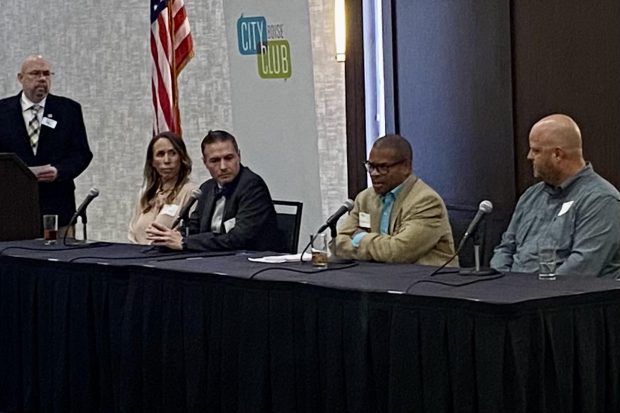BOISE — The City Club of Boise on Wednesday hosted a conversation on the “Possibilities and Pitfalls of AI” at the Downtown Grove Hotel.
The four panelists were Will Goodman, the Boise School District’s chief technology officer, Equifax vice president of AI and machine learning Josh Johnston, Stoltz Marketing Group creative director Crissie Hoskins and Idaho Nuclear Lab senior software commercialization manager Toussaint Myricks.
They addressed concerns about AI’s rapid emergence, and the opportunities that it presents in today’s world.

“We’re not replacing humans, but to a very significant extent, some human tasks that we have traditionally taken for granted will be eliminated. Let’s be crystal clear about that,” Myricks told the crowd of members and guests. “We are in the process of another fundamental transition of our economy. But it’s a fantastic opportunity to learn new skills, and to really learn how to use these capabilities to exploit them for our significant advantage.”
Goodman presented a picture of AI’s emergence in the education world. The advantages, he said, are the ability of AI to cut down on planning time and to help provide the foundational, surface-level learning from which students can dig down in deep knowledge.
“It has an ability to streamline processes, has the ability to really improve teachers’ daily lives by reducing the administrative burden on the classroom,” Goodman said. “If you need to generate a letter to your class, if you need help with grading, it can help with that. It can help you plan you schedule and plan your day. It can help with lesson planning. It can help with writing individual education plans.”
But there is concern that students can use AI to cheat. This problem, Goodman said, can be addressed in two ways: working with students to utilize AI and to go beyond AI’s capability of surface level learning and transfer it to show deep learning.
“Chat GPT is capable of surface learning — this is transparent,” Goodman said. “If our teachers are teaching down (to a deep) level, which they are all striving towards, they don’t need to worry because it’s not going to be able to replicate that.”
AI, Goodman said, works by scraping accessible information on the internet; information that’s been uploaded by humans. Panic about student cheating, plagiarism, bias and racism are real concerns because those things come from and arise out of an interconnected digital world. People are working to fix that, but this is just another aspect that teachers need to be cognizant of when using AI on administrative tasks and when teaching students about AI.
The other big concern, Goodman said, is that AI’s ability to scrape information stops at paywall. This means that most scholarly information, especially that knowledge developed at universities, is blocked from artificial intelligence’s reach.
“It’s not able to access the most academic material out there,” Goodman said. “It’s not getting to the real knowledge, the most accurate knowledge that we have out there that’s been vetted — the true knowledge out there.”
That being said, Goodman asserted, the most important thing for teachers to realize about AI is that students need to be situated with the ability to adopt and embrace its transformative power. The automobile put blacksmiths out of business, but created a massive auto industry. Instead of putting accountants out of jobs, computers helped to generate more accounting jobs than there were before its advent. While Chat GPT and its brethren may push some current careers out, AI is likely going to create new careers.
“One of our jobs as educators is not preparing our students for today, but preparing them for the future, preparing them for jobs that don’t even exist yet,” Goodman said. “Teaching our students to use AI ethically and in the best way possible is going to better prepare them for whatever jobs may come out of this and to have the best position in the market in the future.”
